Fun Palaces ‘action learning’
Fun Palaces ‘action learning’
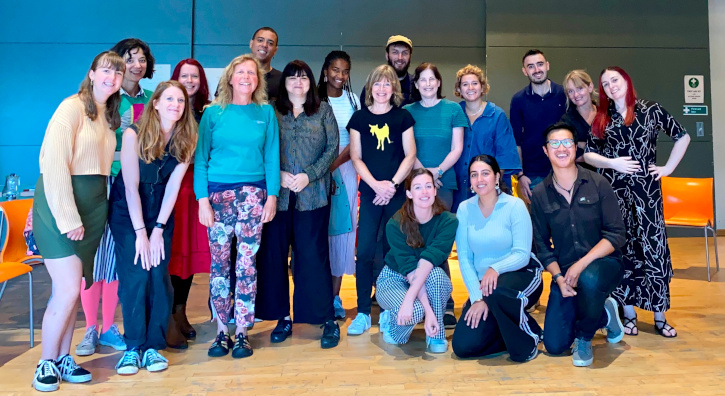
Activities coordinator, Stefan Boakye connects with UK-wide partners as part of the Fun Palaces project
Trinity is a key partner in Fun Palaces, a national campaign that is making arts and culture more accessible by supporting people to plan and deliver creative events in their communities.
As part of my role, Community Activities coordinator, I have connect with local residents and community groups to offer help and support so they can set up their own creative activities. This includes Ruth Harrison and her ‘Recycle City Project’ and new resident group Impact Bristol.
"I learnt that many other organisations where also exploring developing networks between organisations and we discussed ways to make this more effective"
In January we hosted an 'action research meeting' with the Fun Palace partners. These meetings are a way to collectively gather feedback, improve working practices, learn from each other and create new connections. Partner organisations are based across the UK and included the Albany Centre, The National Trust for Wales and Rotherham Council Libraries.
We began the day by introducing ourselves and checking in on what each organisation was currently focusing on. We had a fun icebreaker which involved us talking to each other about what our ‘special’ skills were.
Following this we took part in an evaluation session with Sarah Boiling and shared our progress within the program, success stories and challenges. This session was more focused on the things we liked about Fun Palaces and how we can develop these themes. This was very valuable as we all explored the ways in which the Fun Palaces message helps us all in our individual roles to talk about the importance of making arts and culture more accessible.
After this we had lunch delivered from a local Caribbean takeaway ‘Nadine’s Caribbean Cafe’ and we had another opportunity to chat and bond with each other before we went back into our final ‘Open Sessions’.
‘Open Sessions’ brought the group together to raise any topics they wished to discuss. If someone wanted to raise a topic, they would announce it in the centre of the room and then find a designated space to host the discussion.
I took part in several of these discussions and it was useful to pick up tips and hear the experiences of other partners and makers. The fact that we were encouraged to talk freely amongst ourselves meant that we covered a lot of important topics. For example, I learnt that many other organisations where also exploring developing networks between organisations and we discussed ways to make this more effective.
We finished by sharing what we had gained from the day, how we were feeling and any final thoughts. I mentioned that my involvement in discussions about building networks would be very useful in helping me to form ideas to develop a community network which will connect individuals and organisations.
The event was really positive and it was great to see so many people who were passionate about what they do and the communities that they are trying to reach, which made me feel more inspired about my role.
To find out more about the Fun Palaces campaign, how to get involved and how to create your own Fun Palace contact our Community Producer Stefan on: stefan@trinitybristol.org.uk
Dance for social prescribing
Dance for social prescribing
In 2022 Trinity took part in the Thriving Communities initiative, to develop a programme of creative activity in response to the increased isolation that many people - including older people and those caring for young children - experienced during and post-pandemic.
The year-long initiative, led by specialist 'arts-on-referral' practitioners, creativeShift pioneered a new model of using the arts to improve health and well-being. The pilot project helped to connect key partners in the arts, health and social care setting, to help communities rebuild and recover.
“The art helps you to manage your own feelings and learn how to cope with things. It has given us transferable skills, and I have noticed how the participants have grown in confidence”. Anita, Gentle Creative Dance
Building on our previous Moving Bristol project that explored how dance can be used in a social prescribing model, we connected creativeShift with some of Trinity's resident community groups to design a programme of activity that was subsequently delivered to service users who were referred by local health and community partners due to their health needs.
Over the last year, we have been able to utilise our unique position as a trusted community arts hub to build resilient cross-sectors partnerships, including strengthening links with community health providers Wellspring Settlement, who referred patients to our free-to-access programmes.
Social prescribing delivery in practice
creativeShift worked with Gerry's Attic - an over 55's dance group who meet regularly at Trinity - to create Gentle Creative Movement, a weekly programme designed to increase well-being and confidence for those who may be experiencing long term health issues effecting their mobility.
One Gentle Creative movement participant now volunteers at a local dementia café saying that going to sessions had “... given me the confidence to do that.”
Social prescribing specialists from creativeShift also collaborated with Bristol Children’s Centre (CBCC) to design a play-based programme for parents and carers of young children born during the pandemic to connect with their children and with each other.


Speak Out Launch
Speak Out Launch
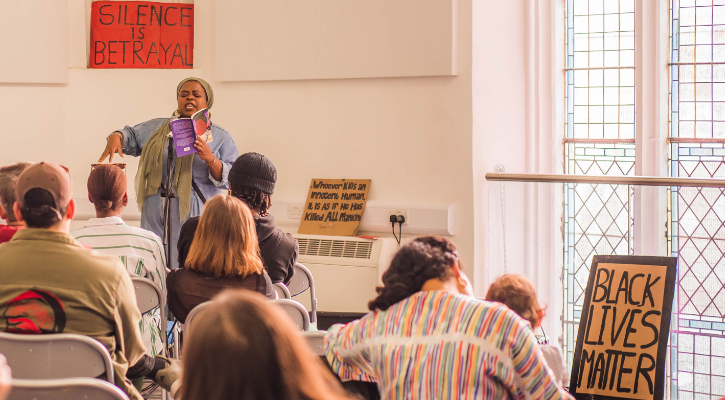
Image Credit: Sophia Stefelle
Speak Out is a new project from Trinity and BBC 1XTRA that offers young people (16yrs - 18yrs) the opportunity to take part in a free-to-access course to learn how to use arts to address social issues.
"Speak Out is a really exciting project that will connect the next generation with present diverse grassroots artists and activists and the wider creative industry" Esther Afikiruweh, Speak Out Producer
Launching in September, the project will invite leading industry creatives to deliver master-classes and workshops that will give young people artistic tools to tackle subjects that matter to them and develop solutions to issues they and their local communities face.
In partnership with organisations including Noods Levels, as well as prominent Black artists and activists, young people will have the opportunity to explore different creative tools including poetry, design, audio and film through workshops and masterclasses.
Alongside this young people will be able to help shape Speak Out, including co-creating elements of the project and its visual identity.
Throughout the programme, there will be an opportunity for participants to connect with creative industry professionals through artistic skills-based sessions as well as interactive workshops and external trips exploring the future of social action.
The project will culminate with Noods Levels collaborating with young people to create platforms for showcasing the content, stories and artistic ideas created throughout the project. Young people will have an opportunity to connect with broadcast media, film-makers and other professionals to kick-start their next steps as future change makers.
How to get involved:
As funded by BBC 1XTRA, we welcome attendees of Black heritage.

Introducing: The Den Socials
Introducing: The Den Socials
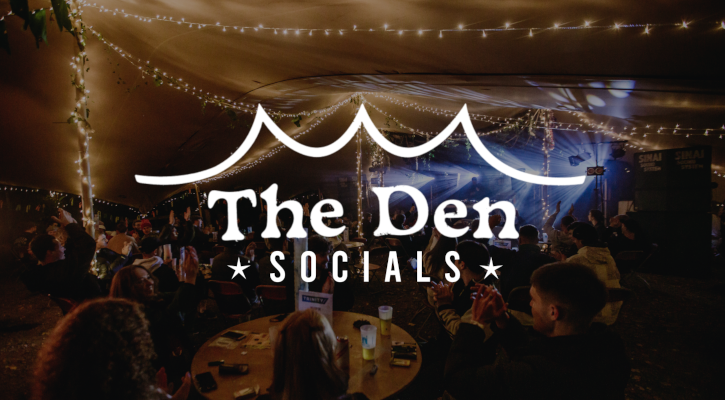
Set the vibe for your weekend at The Den Socials in our outdoor venue
Nestled in the grounds of the historic Trinity Centre, uncover The Den; a place for food, friends and some of the best music from the underground scene right now.
From March 03 head down to the The Den Socials on Thursday and Friday evenings and enjoy food from local vendors, drinks and music from resident DJs and collectives.
The Den will be hosting local independent food traders and resident DJs each month. In March, local vendors Ceylon and Beyond and Small Fire Pizza will offering an array of Sri Lankan Street Food and handmade stonebaked pizza.
DJ collective Booty Bass - fresh off their sell-out New Year's Eve event at Trinity - will help set the tone for the weekend with their Friday evening residency (6pm-9pm). On Thursdays the Trinity team have connected with some of Bristol’s best producers and DJs to bring you an eclectic mix of artists including Mr Fitz, Kreed and Discobobulator.
Launching on 03 Mar the Den Socials will run Thursday/Friday evenings throughout the spring.
There is no booking required and entry is free – just bring good vibes and good friends.
Find out more about The Den Socials on trinitybristol.org.uk
March lineup:
Thursdays: Mr Fitz/Kreed/Discobobulator + more TBA
This series is part of Trinity Presents - our in-house programme in our brand new outdoor venue The Den.
Introducing: Next-Gen Sounds
Introducing: Next-Gen Sounds
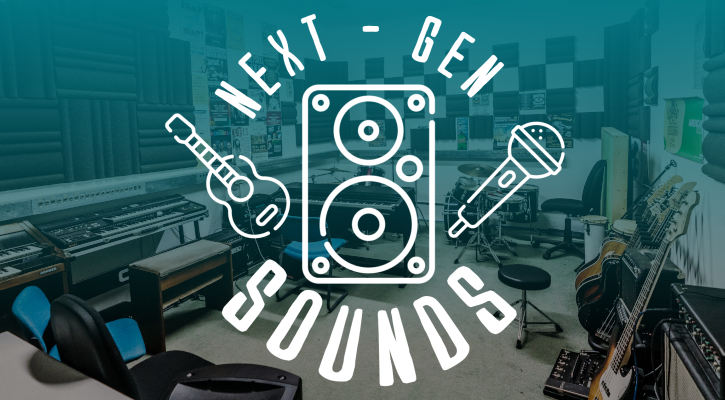
Next Gen Sounds is a new open-access music education session for young people aged 14-25 that offers the chance to gain knowledge and skills from expert tutors in Trinity’s fully-equipped rehearsal room and production studios.
The sessions will be student-led, meaning that young people will be able to shape the programme to suit their interests and ambitions; whether that be learning to play instruments, music production, performing live, or anything in-between.
Trinity’s in-house music tutors, Fern and Pete, will also be on-hand to offer support and guidance to students during the sessions. Students will learn together as a group, offering a chance to work collaboratively and meet other young people.
Next-Gen Sounds is free to-access and is part of Trinity’s ongoing commitment to offering music education to young people that may not otherwise have access to music equipment. There will be free food at the end of each session, provided by Pret a Manger, as well as any travel costs covered (to and from the Trinity Centre) to ensure that the course is accessible to everyone.
The course starts on 9 Feb 2023 with an introductory session, allowing participants to meet the tutors and other students, to take a look at the space and discuss what musical skill students may want to explore.
To find out more about taking part in Next-Gen Sounds, click here.

Becoming A City Of Culture
Becoming A City Of Culture
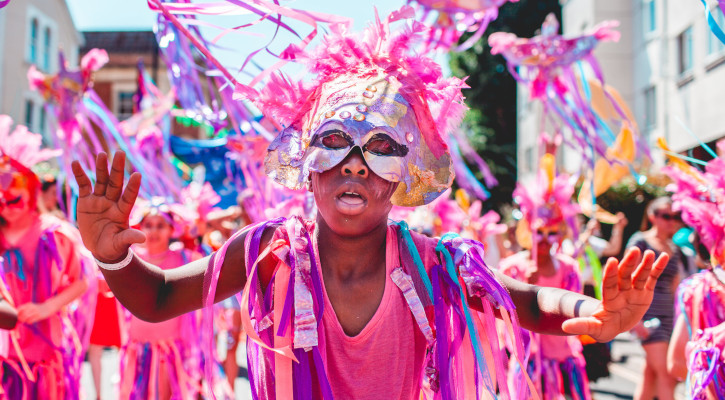
Image credit: St Paul's Carnival
In partnership with St Paul’s Carnival/Trinity and David Jubb of Citizens In Power, we are exploring how to co-create a cultural strategy for the city and surrounding region with citizens.
During this research phase, funded by Calouste Gulbenkian Foundation (UK Branch), we invited a range of collaborators from the sector who place participation at the heart of their practice to hear from some of the best speakers working in democratic decision making right now.
Part 3: Becoming A City Of Culture
In our third blog we reflect on the thoughts and experiences of Bradford 2025 team members, May McQuade and Jack Lynch who used the Citizens’ Assembly model as part of Bradford’s successful UK City of Culture 2025 bid.
May McQuade was the Programme and Community Coordinator for Bradford 2025. It was her role to explore what they would do if they were to win, and what programming could happen during the bidding period. This involved lots of consultation work, spreading the word around the bidding and getting people on board.
Jack Lynch worked on creating the campaign and brand for Bradford 2025. His role looked at how the City of Culture bid looked and felt, and the story they wanted it to tell. Jack spoke about being particularly keen to make something that felt truly original in Bradford, particularly with regards to how people normally spoke about the area.
The group were interested to explore what the catalyst was for this groundswell of positive engagement with the Bradford 2025 campaign. Jack shared that there was a focus on taking public opinion and universal truths about Bradford, and working them into the campaign. They found this was a way that everyone – from people in the arts sector to people in the street – could understand the aim of winning a City of Culture bid, and that this helped create a high level of engagement. The group discussed that ‘finding the city’s universal truths’ could be an important part of a City of Culture bid for Bristol.
Delving into the local authority’s involvement in Bradford 2025, May shared how the council had set up and invested in the trust then fully supported the bidding process. The decision for the bid to be separate from the council gave the team creative freedom.
There was a question posed from the group about the high number of people of Pakistani heritage living in Bradford, and how the bid was representative of this community. May spoke about several staff and steering group members being of South Asian heritage and the broad consultation events taking place in every ward of the district. May also shared that part of the bid’s focus was around improving representation in decision making roles within the arts, and supporting growth of the South Asian arts offer in Bradford. She went on to say that there are also many other Global Majority groups living in the area, and they wanted to make sure everyone was involved - which was admittedly difficult. The group spoke about Bristol’s arts sector not being fully representative of the diverse population of the city, and how there would need to be careful thought put into that during the bidding process.
When asked what the biggest takeaways were from the process, Jack spoke about understanding that from a marketing perspective this is essentially a political campaign. May shared that, on a personal level, she felt it was important to start with a pace that makes sense with the communities you’re working with and not push too hard from the beginning – it’s a fast paced process and can easily become overwhelming.
Interested in finding out more?
- Read the blogs so far: Part 1 What is a Citizen's Assembly? and Part 2 Art, for, with, by the people
- Keep up-to-date about the project by joining our mailing list
- Read Freddie Wulf's article: Identity Capital
- Watch Trinity's take over of the Radix Big Tent
- Join in the conversation using #67MillionVoices
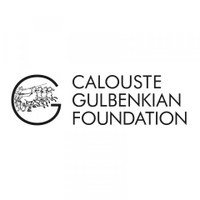
New music-making partnership launched
New music-making partnership launched
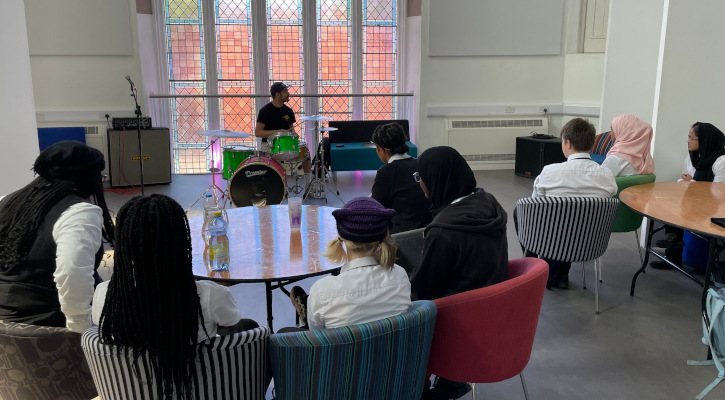
Students from local secondary taking part in an Industry Insights session
We have joined forces with leading youth providers Creative Youth Network (CYN), Aspiration Creation Elevation (ACE) and Basement Studios to offer the opportunity for over 2.5k young people to access free music-making provision. The project is supported by Youth Music using public funding by the National Lottery through Arts Council England.
During the next 18 months, young people from Bristol and South Gloucestershire will have the chance to explore their musical talent and pursue careers in the music industry. Each organisation in the partnership are working closely with communities within Bristol and South Gloucestershire to ensure that there will be a variety of programmes to suit the interests of those taking part.
Across the project, Youth workers and mentors from across the partnership will work together with young people, helping individuals to plan out their personal journey to making music, building creative confidence and nurturing their ambition. Activity will focus on three key areas: building confidence, upskilling, and industry experience and insight and will include developing a 'youth voice' where young people will have the opportunity to be co-designers of the programmes.
As part of the project Trinity is hosting open access music sessions alongside Music Masterclasses where young people are able to meet and learn from professionals as well as network with other emerging musicians
Click here to find out more about the project or sign up to our mailing list to keep up-to-date about activities for young people (up to 25yrs).
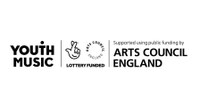
From the archive: Same building; different meaning
From the archive: Same building; different meaning
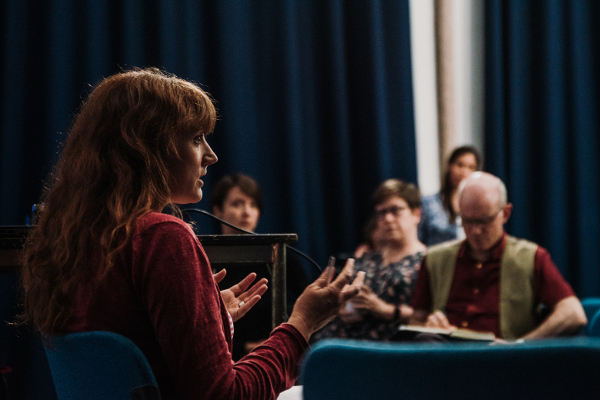
Dr Katie McClymont's talk '...and The Spirit Lingered On' explored the idea of community spirituality photo@ Khali Ackford
As momentum builds to save Jacob Wells Baths and return the listed building to community use we are looking back at our archive and sharing our blogs exploring the importance of community spaces. In this blog, first published in 2018 as part of our Heart & Soul heritage project, we reflect on Dr Katie McClymont's (UWE’s Senior Lecturer in Urban Planning) public talk about municipal spirituality and its social context.
"Before Katie’s talk I did not understand much about the subject but it was an enormously interesting presentation with many specific examples from around Bristol." Audience member
The talk began with an explanation of the meaning of municipal spirituality and the way it occurs in places with civic and spiritual functions. The term is quite broad and can be applied to music venues, libraries, ex-churches, parks, public spaces and community centres. The factor of whether the space is inside or outside is irrelevant, it is the sense of potential for togetherness or inclusivity that is the key. This feeling does not have to respond to an existing religion, it can be responding to something beyond the everyday realm. For example, cemeteries are not necessarily places of religion but to many people have an enormous sense of the spiritual.
As part of her talk, Katie showed examples of church buildings around Bristol that have been re-purposed. They are all buildings that she happened to be passing on her route around the city on a given day, showing how many church buildings are scattered across the city, and the great proportion of them which are being used for something different than the original purpose.
Katie talked about how, through the 1970s and 1980s, there was an exponential rate of church closures. Some of these still have a social function, such as a former church in Easton that is now a centre for supported independence. Currently the Church of England (C of E) closes around 20-25 churches per each year.
A report from the charity Locality documents this selling buildings and what comminities are doing in response to this.
"I found it very interesting to hear that C of E churches are available for sale, listed on the C of E website for the public to peruse. Some of them have descriptions about their future use, for example ‘for continued worship’, ‘community work’ or ‘suitable for a wide range of uses’." Tess Sieling, project intern
Katie cited the strange feeling around seeing churches for sale in such a matter of fact, straightforward way when in fact they are very special buildings. This raised the question: can you put a price on a church? Also, what judgements are being made about the buildings before they are sold? The example of the Bill’s restaurant chain taking over old church buildings was used, as Katie said that in some cases the insides are ripped out but the strong ethos from the church remains. Even in its new function, sometimes a feeling of the old spirit lingers on. Katie is a very passionate advocate about the amazing idea that churches will always be a place to create connections between people and others; people and the past; and people and something bigger than themselves.
Katie made a film about community art spaces around Bristol including Trinity, Jacobs Wells Baths, Barton Hill Settlement and St Mary Redcliffe Church. As well as being a great medium to communicate the joys of community spaces, Katie said that when they were interviewing people from these spaces, after being asked a question, the interviewee would often give a very telling pause before answering which she believes shows the sense of the community space working beyond its physical and material achievements. Sometimes when churches are changed into private use buildings like a holiday home it can feel wrong and perhaps this is due to that change away from its original ethos. Is it because there is a feeling of loss of the shared community space that once was there?
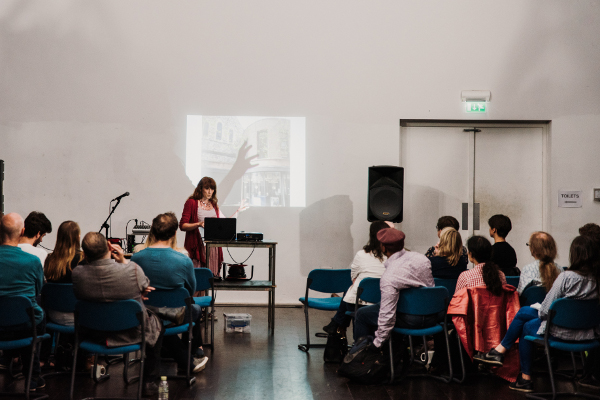
What is the value of a church when it no longer is a church? Photo credit @Khali Ackford
Sometimes when churches are changed into private use buildings like a holiday home it can feel wrong and perhaps this is due to that change away from its original ethos. Is it because there is a feeling of loss of the shared community space that once was there?
Churches have value. They have a common purpose and a built heritage. The debate is what is their value is and when is it lost? If the value is the sense of people coming together and socialising with people they would not normally, then spaces like Trinity offer us examples of activites that do this with great popularity and with no religious aspect.
Churches closing have caused massive losses to local communities. In addition, a lot of us now live in self selective communities, so where do you meet people different from you apart from in a doctor’s waiting room or on a bus?
Katie's talk highlighted the importance of having inclusive places where different people can engage in a meaningful way. Do we define using a church as a multi use community space as adapting the church or losing the church? As an increasing number of us are of no religion, perhaps we are adapting churches to keep them relevant and concerts, gigs and other actitivites offer us that place to congregate in our secular state.
This write up was by Tess Sieling, who was the project intern on the Heart & Soul heritage project. The talk was part of a series exploring the challenges and achievements of transforming and preserving historic buildings and was programmed in collaboration with Bristol's Architecture Centre and the University of West England (UWE).
How to get involved
Click here to sign the Hotwells and Cliftonwood petition to Save Jacobs Wells Baths
Further reading
Read more from Katie McClymont in her published journal, Spaces for Secular Faith
Read more from our Heart & Soul talk series - Father Paul, Fidel Meraz and A Million Bricks of Love.
Read more about the Save Jacobs Wells Campaign here.
Save Jacobs Wells Baths
Save Jacobs Wells Baths
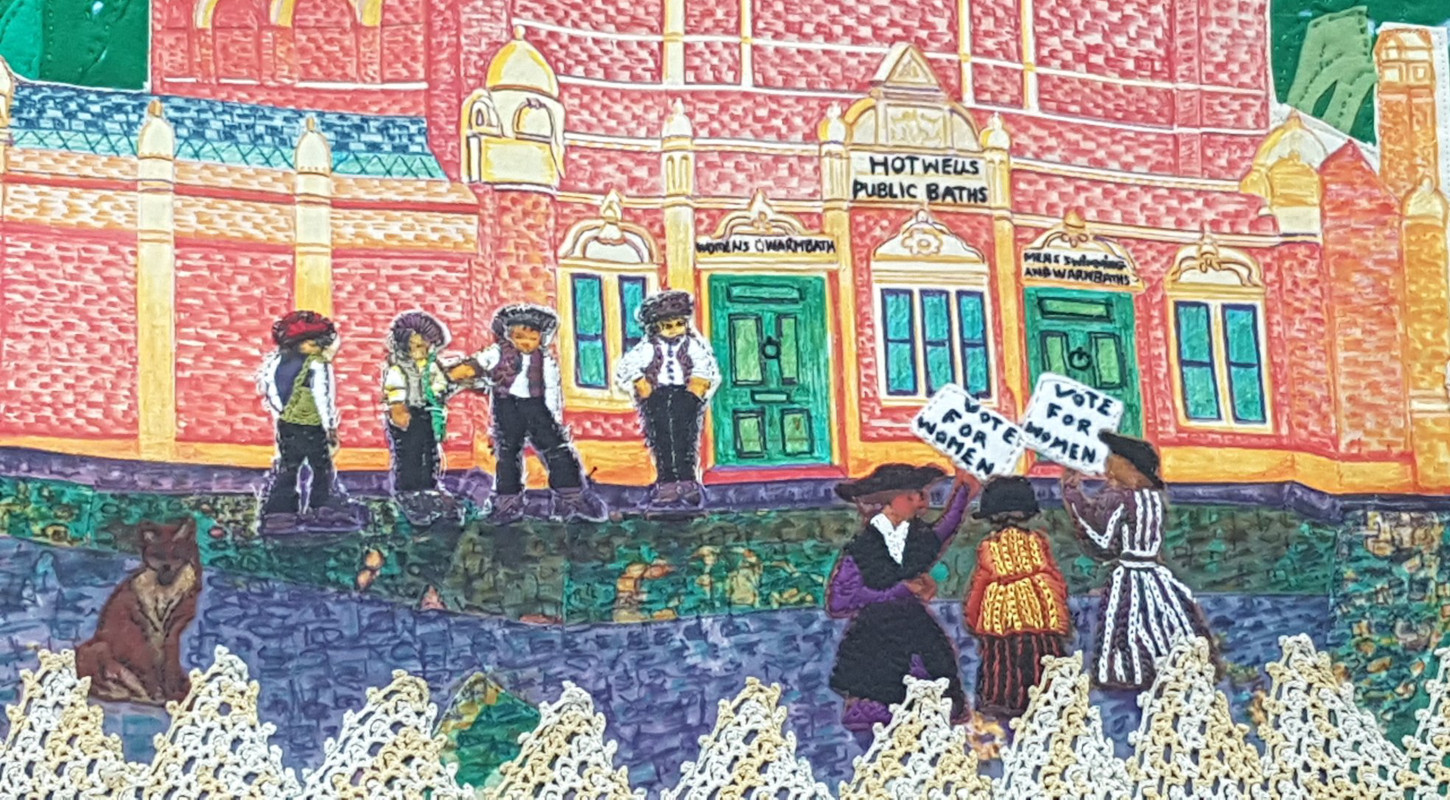
Artwork credit ASLS
Trinity CEO Emma Harvey reflects on the importance of community buildings following the news that Jacob Wells Baths is now at risk of being taken out of public ownership.
Jacobs Wells Baths is an asset owned by us. Built in 1889 to serve the working poor, the Grade II Listed building holds within its walls a wealth of of architectural and social heritage - from its time as a public swimming baths to its 30 year history as a dance hub.
This all risks being lost as, in December 2022, leisure company Fusion Lifestyle announced they were pulling out of restoring and managing the space meaning our cash-strapped local authority may now table it for disposal.
The story of this asset is sadly not unusual. A 2019 report by Bristol Cable revealed how Bristol City Council has sold off millions of pounds’ worth of public property as part of their ongoing response to austerity. This local saga is set against a national backdrop dubbed as ‘The Great British Sell-Off’, with local authorities across the UK attempting to combat funding crises through sale of our shared civic and heritage spaces.
"One thing you can say about Bristol is we’re a city that has demonstrated we can take complex heritage assets and transform them into viable community and cultural hubs."
It’s a pattern that shows no sign of stopping in 2023. Bristol faces yet another round of cuts and the pressure’s on to plug a £32m funding gap in whatever way possible. 134 years on from the Baths’ construction, it feels as though Bristol folk are still working hard though still very much the poorer for it.
It’s really easy to reduce these buildings to numbers on a spreadsheet. If we sell Jacobs Wells then the headache as to what to do with it next is finally over. Plus, we get some cash to plug a gap so we can all breathe a temporary sigh of relief until the next cycle of cuts. If you grew up poor it’s actually understandable. I’m sure many of us have memories of our parents pawning what few possessions they’d acquired just to make ends meet. It’s just what you do when you’re broke.
The problem though is that, when our Councils take this same attitude to balancing the books, this robs current and future generations of the assets we own and makes us all collectively poorer. In a city like Bristol, growing in density and diversity, it deprives us of places to come together, connect and share experiences. To learn and grow, to grieve or to celebrate. To keep fit, dance and be merry. To avoid loneliness or just to get out of the cold. Even to problem solve, mobilise and take collective action about the things that matter to us.
What is unusual about Bristol though is that for every Jacobs Wells Baths there are other success stories that run counter to this ‘sold from under you’ narrative. From Spike Island, to Watershed, to the Tobacco Factory, one thing you can say about Bristol is we’re a city that has demonstrated we can take complex heritage assets and transform them into viable community and cultural hubs.
The Trinity Centre is one such building as over the last 15 years we have demonstrated that we can take a big old dilapidated liability and transform it into a celebrated, multi-use arts and community asset.
So what’s stopping us from doing the same with JWB? Even with our track record, groups like Trinity just aren’t treated as serious contenders when the future of assets like Jacobs Wells Baths comes up for discussion. Maybe that’s because we don’t have millions of pounds at our disposal, or maybe its because I look like a Fraggle and talk like the love-child of Russell Brand and Janet Street-Porter. Decision makers just aren’t that great at trusting anyone to solve complex problems if the solution isn’t packaged in received pronunciation and a smart suit.
We don’t do it because we’re told we can’t, are scared to try or don’t believe we can. If we want to change this narrative this doesn’t start with the Council. It starts here and now with us. If we want to save our spaces and protect Jacobs Wells Baths and other shared civic spaces for this and future generations, as citizens we need to come together and say we want one last shot at reimagining a different future.
The Council may be the landlord but these buildings are ours. Once they’re gone they’re gone and there is no going back. We just need to believe for a moment that we can do this Bristol. Let’s put our heads and voices together and make it happen.
Take action today:
- Contact your Councillor and MP – write to them about why JWB is important
- Prepare a statement for local Cabinet
- Check out past feasibility study and plans for viable asset management
- Send your support to ensure it is registered as an Asset of Community Value
- Share on social media using the tags #SaveOurSpaces #SoldFromUnderYou #SaveJWB
- Read our 100 Beacons Report and find out more about Power to Changes We're Right Here Campaign
Stories of Resistance
Stories of Resistance
From riots in 1831 to the Colston statue and Kill the Bill protests, Bristol has long been a city renowned for radical action. Now, as then, radicalism has been accompanied by an outpouring of creative responses - from poetry to illustration to performance.
Now, Stories of Resistance, a new nine-part podcast series has been launched, uncovering some of Bristol’s lesser-known stories of contemporary activism. From the story of how one moment changed the direction of a grassroots boxing club, to a mother’s journey into disability activism, to changing the face of environmentalism and pushing for better gender representation in the music industry, these podcasts explore the stories of ordinary people fighting for change.
"What I noticed was by taking part in this project people discovered that there are so many people battling injustices and fighting against social injustices and yet so often don’t see themselves as an activist." Miranda Rae, Community Journalist
The series was created by Bristol residents during workshops with award winning journalist and broadcaster Miranda Rae (Sound Women SW and Ujima Radio). Over four months Miranda hosted group and 1-2-1 training sessions where participants learned how to produce, research, record and present a podcast.
The podcasts were commissioned as part of Art of Resistance, our two-year Heritage Lottery Funded project that has been exploring, documenting and celebrating the human stories behind activist movements in Bristol.
The podcasts will be distributed on Ujima Radio on Sundays throughout January at 11am starting on 08 Jan throughout January 2023 and will include interviews with the creators as well as Dr Edson Burton, who is the driving force behind the project. Please note that the episodes may include language and topics that may not be suitable for all audiences.

Art, for, with, by the people
Art, for, with, by the people
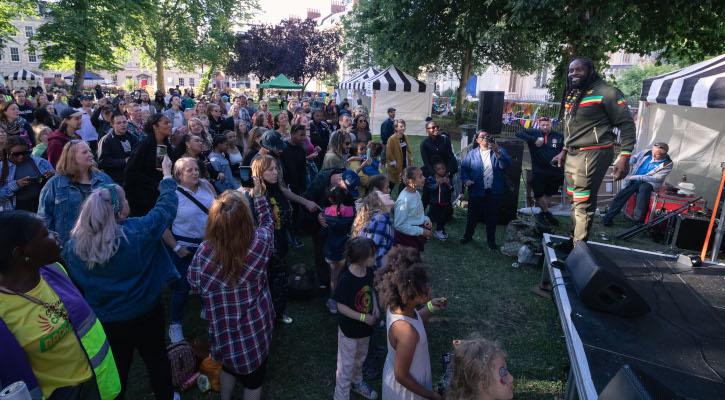
St Pauls Carnival
In partnership with St Paul’s Carnival and David Jubb of Citizens In Power, Trinity are exploring how Bristol can co-create a cultural strategy for the city and surrounding region.
During this research phase, funded by Calouste Gulbenkian Foundation (UK Branch), we invited a range of collaborators from the sector who place participation at the heart of their practice to hear from some of the best speakers working in democratic decision making right now.
These focus groups have been a chance to share ideas, experiences, knowledge and expertise on co-creation, participatory democracy and how we can do things differently in the culture sector.
In a series of blogs we are documenting and sharing what we are uncovering this journey. For our first focus groups we welcomed Brett Henning, co-founder of the Sortition Foundation and Janet Vaughan, designer and co-artistic director of Talking Birds to share their experiences of creating Citizens' Assemblies.
Part 2: Art, for, with, by the people
Janet Vaughan is the co-artistic director of Talking Birds Theatre Company who hosted the UK’s first Citizens’ Assembly on Arts, Culture & Creativity as part of the 2021 Coventry City of Culture. The Assembly took place over six weeks and produced recommendations that were incorporated in the city's Cultural Strategy. We invited Janet to share their experience of using this model and what they learned during the process.
Joining us on Zoom, Janet first shared how their interest in participatory democracy came from the early day of the pandemic where a large proportion of people in the UK suddenly had time 'to do things'. During this time, Janet shared that they took part in online conferences and events by organisations including Civic Square and that this initial engagement was the spark that led to their hosting of a Citizens' Assembly.
The initial barrier to programming the Citizens' Assembly in Coventry was engaging with stakeholders to invest in the process - as Citizens' Assemblies are very expensive. However, Talking Birds, in collaboration with stakeholders, felt it was important for people, outside the cultural sector, to have a voice in creating a cultural offer.
Through David Jubb, Janet connected with the Sortition Foundation and they acted as the independent organisation who would administer, engage and select participants for the Assembly. The Sortition Foundation worked to ‘crunch’ the numbers to ensure participants reflected the demographic data that has been specified.
As with other UK Assemblies, Talking Birds paid for participants to take part and supplied people with the tech they may have needed for engaging in the process during a pandemic. They also offered 1-2-1 tech support to ensure engagement was equitable.
The group were interested in whether the Citizens' Assembly ‘made a difference’ and if the process enabled learnings that were 'surprising or unexpected'. Janet shared that, yes, firstly because conversations were had that otherwise would not have been able to happen and, secondly, because the people who took part would not normally have been able to engage with each other. Then finally, that because the Citizens' Assembly approach is tried and tested, it created real spaces for conversation, questions and ideas.
The group were then interested in how to go about choosing the provocation for discussion during the Assemblies'. Janet shared that Talking Birds set up an oversight committee to explore what their provocation would be. At the time there was a drive to ‘build back better’ and the committee, through discussions, came to an agreement that they wanted to explore the role of art and artists in this.
The final part of Janet’s talk looked at data and numbers. The Coventry project ran over six weeks, 50 people took part in the Assembly itself across six learning sessions with evidence from around 12 expert witnesses. The cost to run and engage participants was around £120k.
Janet reflected that it was brilliant to watch the participants build confidence over the project and felt the approach enabled people to feel autonomy, listened to and that their questions were valid. From these, recommendations were drafted and put to vote at the Assembly and then went through a process of refining the recommendations which where eventually submitted to the Council for consideration.
We will continue to share our findings from the research stage of our project alongside programming further focus groups and action-learning sessions.
Interested in finding out more?
- Read part 1: What is a Citizen's Assembly?
- Keep up-to-date about the project by joining our mailing list
- Read Freddie Wulf's article: Identity Capital
- Watch Trinity's take over of the Radix Big Tent
- Join in the conversation using #67MillionVoices

What is a Citizens' Assembly?
What is a Citizens' Assembly?
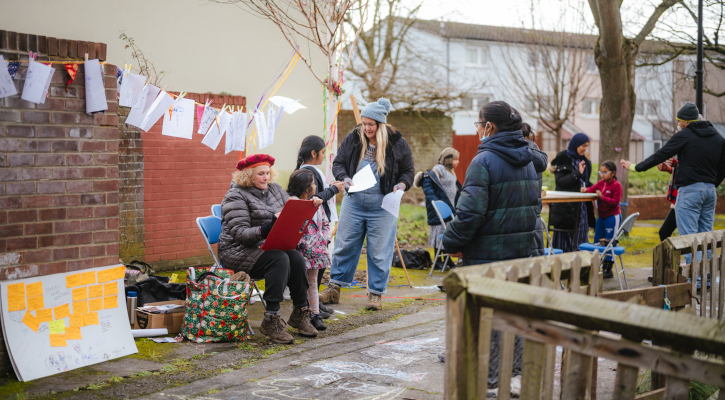
Community Painting Day. Photo credit: Khali Ackford
In partnership with St Paul’s Carnival and David Jubb of Citizens In Power, Trinity are exploring how we can co-create a cultural strategy for the city and surrounding region.
During this research phase funded by Calouste Gulbenkian Foundation (UK Branch), we invited a range of collaborators from the sector who place participation at the heart of their practice to hear from some of the best speakers working in democratic decision making right now.
These focus groups have been a chance to share ideas, experiences, knowledge and expertise on co-creation, participatory democracy and how we can do things differently in the culture sector.
In a series of blogs we are documenting and sharing what we are uncovering this journey.
Part 1: What is a Citizens' Assembly?
For the first focus group we welcomed Brett Hennig, co-founder of the Sortition Foundation. The Sortition Foundation is an organisation that believes in representative and participatory politics, with a particular focus on Citizens' Assemblies.
The purpose of these assemblies, Brett outlined, is that they bring people together from all walks of life and give the time and space for people to collectively tackle issues. It is a model, Brett shared, that Bristol itself has delivered as part of its plan for post-Covid recovery.
Citizens' Assemblies work by a three-part process of learning, discussion, and decision-making. In the learning stage, evidence is presented on the topic by ‘expert witnesses’, the group then discuss this evidence and work together to come to a consensus to create recommendations. These recommendations are then put to the vote. The recommendations that are most supported can become the official recommendations of the assembly.
Brett stressed the importance of having representation in a Citizens' Assembly, so the pool must be reflective of demographic data and, in the case of our project, cultural engagement. He shared that, unlike politics, Young People (30 and under) are represented in Citizens' Assemblies because of the nature of the selection process that reflects a city’s demographic data.
Participants of Citizens' Assemblies are selected via an independent third party - these organisations will initially contact citizens directly using a database, such as the Royal Mail’s database of every postal address in the UK. There is then a second selection of the people who respond to the invitation based on the demographic data they provide.
The group were interested in how the experts are selected - as this could be contentious. Using an example of congestion in a city, Brett explained that a Local Authority could commission an external third party to collect the evidence at hand, perhaps from an open call out. An Oversight Group for the assembly will be given the responsibility for ensuring the evidence that is presented to the assembly is balanced. Assembly members can also be part of the process of identifying contributors to the assembly. This would enable a wider pool of opinions, practically from those invested in the topic with expertise and/or lived experience.
The group wanted to understand how large a Citizens' Assembly should be. Brett shared that, in deliberative democracy, it is not a big numbers game. The key is representation. Brett shared that in Ireland, assemblies have seen numbers of up to 100 people, France had 150 in the Climate Assembly, but many local assemblies are around 40 people.
In summarising his talk, the discussion centred around how to ensure that voices are heard and amplified in Citizens' Assemblies, specifically those from Communities who may face barriers to participation. Brett shared that perhaps over-representation could be a consideration so that more communities are attending for specific areas whose voices are historically not amplified. Brett also explained that representation is not only about the citizens in the assembly but also about the voices of those who give evidence.
Interested in finding out more?
We will continue to share our findings from the research stage our project alongside programming further focus groups and action-learning sessions.
- Keep up-to-date about the project by joining our mailing list
- Read Freddie Wulf's article: Identity Capital
- Watch Trinity's take over of the Radix Big Tent
- Join in the conversation using #67MillionVoices

Creativity in East Bristol
Creativity in East Bristol
Over the summer we joined forces with Travelling Light to shine a light on how, with the support of the Coutts Foundation, we are both working to create opportunities for some of the youngest members of our communities to take part in creativity and begin their creative journey.
“Its good to have this so close. Have been walking past for ages and I didn’t know they could come in. Would really like to come again because we don’t have anywhere to play outside as we live in a flat” Feedback from the family garden sessions
Travelling Light Theatre Company are based in Barton Hill - just up the road from where Trinity is based. They create theatre for children and families, run a youth theatre and programme free events and activities.
Their work, like ours, is embedded in local communities and they, like us, are committed to creating opportunities for children and families/carers to take part in culture, to play and celebrate together.
At Trinity this includes weekly Forest School sessions for children aged 12 and under and Family Sessions throughout the school holidays. The sessions aim to support children to develop or build upon their skills. In 2021/22, out of the 357 children who took part in Forest School activity, 97% showed increased confidence.
We also work in partnership with organisations to co-create a programme that responds to need. For example, the Creative Play Sessions - delivered with East Bristol Children's Centres - supports families with young children to connect through art. Read more about this project here.
If you are a resident of Barton Hill, Lawrence Hill, Newton or the Dings and would like to find out more about taking part in family arts activities you can sign up to Trinity's mailing list here and Travelling Light's mailing list here.
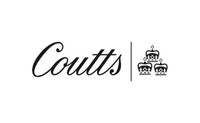
In Focus: Ruth and Fun Palaces
In Focus: Ruth and Fun Palaces
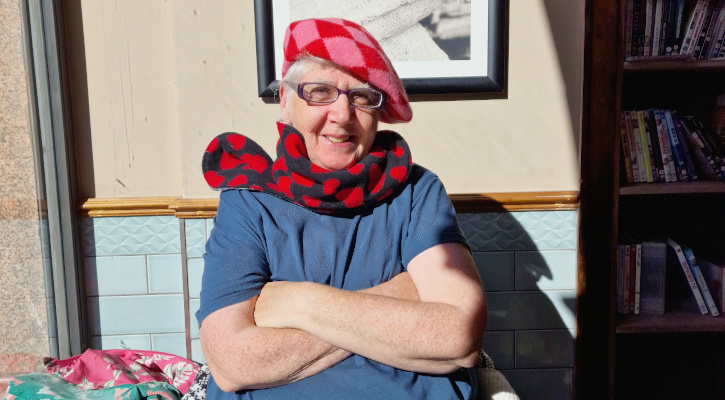
Fun Palaces in a UK wide organisation that supports volunteers, grassroots communities an organisations to programme events or create projects that celebrate the culture, skills and heritage of communities.
"I would love what I do to make a big difference in the world, I would love to do all kind of things like create wonderful things for people like homes for homeless people, or create wonderful animal sanctuaries. I just want to be happy with myself and make a huge difference." Ruth
We are partnering with Fun Palaces as part of thee-year project that aims to give power to communities so they can re-think, re-claim or re-purpose civic and community spaces.
As part of the project, local Newtown resident, Ruth, has been working with Trinity’s Communities Activities Coordinator to develop the ‘Recycle City Project’. The project aims to use creativity and technology to imagine a sustainable future City and hopes to include workshops across Bristol and an exhibition - most of all, Ruth wants to make a difference in the world around her.
Through the Fun Palaces partnership, we are offering free 1-2-1 support to Ruth, helping flash out ideas, apply for funding and support Ruth by attending meetings alongside her.
Ruth first started taking part in activity in the Community Garden at Trinity and remembers the sessions fondly, particularly baking using the outdoor oven and the other people who took part in the sessions. Recently, Ruth took part in The Wish List – a community arts project co-created by Newton Residents and artist Michelle Roache. She reflects that the lantern parade was ‘magic’ saying “we can all make that magic, I’m sure we can make that magic. I think that’s what I’m trying to create in my life, not just for myself, for the world”.
Fun Palaces aims to elevate everyday creativity, especially for those who may not consider themselves to be artists. Ruth feels this is beneficial and expresses this eloquently in saying "like with Grayson Perry, it’s celebrating everyone's unique, artistic, creative talent”.
The Fun Places project will continue until 2025 - click here to find out more about the project and how Trinity could support you to ignite your ideas.
In Conversation: Ishmael Ensemble
In Conversation: Ishmael Ensemble
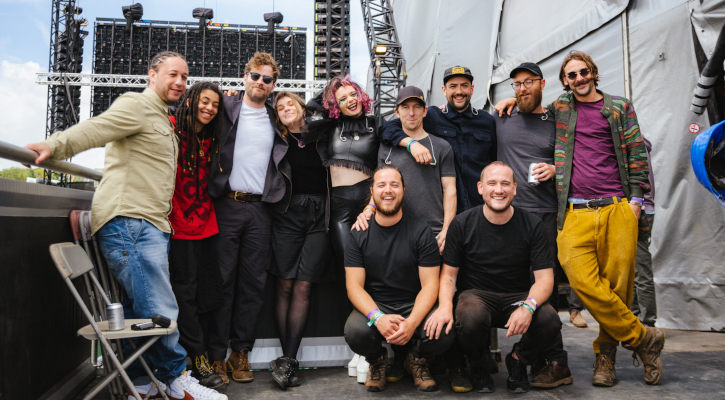
Ishmael Ensemble - Credit: Khali Ackford
We spoke to Pete Cunningham of Ishmael Ensemble ahead of their headline show at Trinity on 10 Nov as part of our in-house music programme Trinity Presents, to chat about the benefits of collaboration, Bristol's music scene, and what's next for Ishmael Ensemble.
Can you tell us a little about how Ishmael Ensemble formed?
I started the project in 2017 having spent years making more traditional sample based electronic music & feeling uninspired by the process so I started recording & sampling the wealth of musicians & vocalists around me in the Bristol scene. It was so refreshing to take things back to the source as well as push myself as a musician. It soon became a live band & the rest is history…
What have been your highlights of 2022?
Without doubt playing the West Holts stage at Glastonbury, I’ve been going since I was a kid & although I’ve played there before this felt like a real bucket list moment. Everyone brought their A-game & I couldn’t be happier with how the show went.
Aside from Glastonbury, we’ve been playing main stages at other festivals as well, it feels like we can finally present the project as I’ve always imagined it. I’ve definitely found a hunger to really hone the live show and dial everything in performance wise. I can’t wait to share what we’ve been up to since then.
It’s also been great to get back in the studio & work on new music.
Collaboration is clearly an important part of Ishmael Ensemble's musical identity - what benefits do you think collaborating with a range of artists provides?
It’s just a great way of staying inspired, it’s amazing to witness how different everyone’s approach to music making is. I’ve learnt so much & made some great friends through the process.
The Trinity show is going to be special as we’re able to invite pretty much all the vocalists & musicians I’ve worked with over the years. A real celebration of the project as a whole.
In your opinion, what makes the music scene in Bristol so special?
I think it’s big enough to attract a large amount of creative people but small enough for everyone to get to know each other. You can go to the pub & the rooms full of people doing interesting stuff & chances are you know most of them (& if you don’t yet, you will soon). It’s also a super-supportive community. Everyone goes to each other’s gigs & sings each other’s praises - there’s no room for inflated egos here.
What should the audience expect from your performance at Trinity?
It’s going to be a one off that’s for sure - it’s our largest headline show so we’ll be playing a super special extended set with loads of special guests joining us on stage as well as the amazing Jelly Cleaver on support.
I also feel we’re playing the best we ever have. It’s been great to really focus on the live show this year, upping the production & just getting the overall live sound & visual aesthetic right.
What's next for Ishmael Ensemble?
There’s lots of new music in the pipeline, some of which we’ll be debuting at Trinity. There’s lots of other exciting stuff but you’ll just have to wait and see for now!
Ishmael Ensemble will play Trinity on 10 Nov as part of Trinity Presents, our in-house programme of music and arts. Click here to get your tickets.
Don Letts
Don Letts
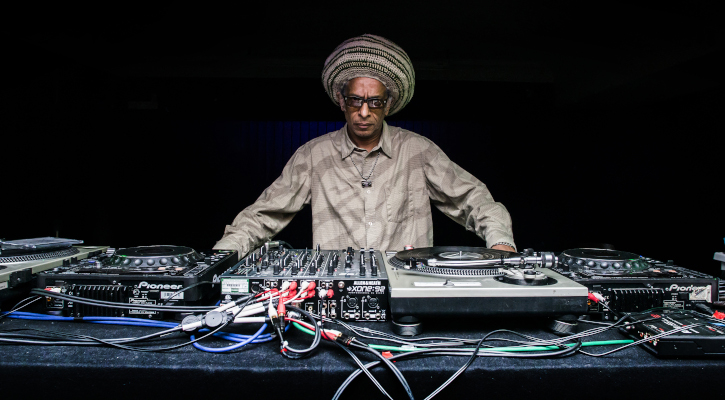
As part of our in house programme, Trinity Presents we welcome Gardna (Fr 14 Oct) who will be joining forces legendary reggae and punk veteran Don Letts.
Trinity's history has long been part of the cultural crossover of punk and reggae scenes which emerged in the late 1970s. Letts was instrumental in introducing reggae and dub sounds to the punk scene at the time. Given this rich history that we both share, we wanted to reflect on some of the key moments in Don Letts career.
- Don Letts was deeply inspired by the roots reggae from his parents' homeland in Jamaica, in particular the anti-establishment message of Bob Marley. After seeing Marley play the Odeon in Hammersmith in 1976, Letts snuck into Marley's hotel room and spent the night talking and befriending him.
"By 1977, the white teenage youths in London were looking for a new soundtrack and punk rock exploded on the scene. Problem was, this was so early in the scene, there were no punk records to play. So I'm spinning what I like, heavy dub reggae, and the punks were loving it. They dug the whole anti-establishment rebel vibe" - Don Letts
- During the 1970s, Don Letts rose to prominence as a resident DJ of The Roxy, a nightclub in London's Covent Garden. While The Roxy was known for being a hub for the punk scene that was growing in popularity at the time, Letts' sets at the venue featured mostly dub and reggae records.
- Letts recognised the natural similarities between punk and reggae, particularly in their shared, anti-establishment message, creating a crossover between the two cultures. Bands like The Clash were one of the first groups to incorporate elements of reggae music into their sound, seen most clearly through their cover of Junior Murvin's 1976 classic 'Police and Thieves'.
- Developing close relationships with punk bands such as Sex Pistols and The Clash led Letts onto creating films based around the punk scene at the time. Letts became the unofficial documenter of the scene, creating 'The Punk Rock Movie', mostly compiled from Super 8mm footage shot of live performances at The Roxy.
- Since then, Letts has gone on to direct over 300 music videos for a range of artists including Bob Marley, The Psychedelic Furs, Elvis Costello and long-time collaborators The Clash.
- Don Letts' life story was recently told in a documentary 'Rebel Dread', released earlier in 2022, featuring extensive footage from Lett's personal archive of videos.
Letts has continued to DJ throughout his career, and has been a regular feature on lineups across Bristol and the West. Don Letts will join Gardna at Trinity on 14 Oct for Trinity Presents: Gardna + Friends. Make sure to head down to catch this legend of the UK music scene (and his extensive vinyl collection) in action. Click here to get your tickets.
About Trinity Presents:
Gardna + Friends is part of Trinity Presents - our in-house programme of music, bringing world-class artists and emerging talent to inner-city audiences.
After the Fire
After the Fire
After The Fire - Film by Matt Feurtado
After the Fire was an immersive exhibition programmed part of our free community party in Sep 2022 . Across nine hours, over 1200 people came along to watch performances from some of Bristol and the South West's leading underground musicians, take part in workshops and much more. The exhibition displayed stories and artwork collected as part of the two-year Heritage Lottery Funded project: Art of Resistance.
From women's rights, worker's rights movements to the recent environmental and BLM movements ,Bristol has long been known as an 'activist city'. We sat down with historian and writer Dr Edson Burton, curator of Art of Resistance, to understand the project’s important contribution to social history:
"After The Fire was a vehicle for showing the midway point that we had reached with the research for the project. We had some fantastic audio from the oral histories we’d collected with artists and activists as well as pieces of artwork that had been inspired by protest.
To my mind it was important to escape the gallery aesthetic, the white-wall space which we normally associate with art, which conveys a certain sense of art as separate from life, separate from lived experience and it has an intellectual and class connotation that might leave some people feeling like it’s not part of their world.
We also wanted to bring the space to life, in keeping with the post protest theme, to stir the embers. With this in mind, we commissioned some of Bristol's leading performers to share their work, acoustically, straight after the soundscape.
The title was inspired by James Baldwin’s The Fire Next Time written in response to racial tensions and riots in 60s America. I wanted to create a sense of a space that carried the sense of the broken, the unfinished, the space after the revolt.
"Collecting archives, interviewing people, is like gathering priceless treasures. I say priceless because, in a sense, an interview is a capture of a voice that may not exist in years to come." Dr Edson Burton
I didn’t want it to feel like, ‘here’s one space that says is about that area of protest and here’s another’ because one of the things that is really striking when you interview artists and activists is often their passions intersect. We found people that are concerned with the environment may also be involved with anti-racism, people who are working on LGBTQ+ rights may also see common cause with anti-racism, and so on.
When you create spaces, they are spaces not just for audiences, but for artists to link, to meet and discuss and share, to see and revive work. That’s such a vital part of why these projects are useful. There is a sense too, that we are curating and holding the experiences that might otherwise disappear. Despite the wealth of research that is available, there are still stories that sink, there are not passed on. Collecting archives, interviewing people, is like gathering priceless treasures. I say priceless because, in a sense, an interview is a capture of a voice that may not exist in years to come."
About Art of Resistance
Art of Resistance is a two-year National Lottery Heritage Funded exploring 100 years of social activism, protest and civil disobedience in Bristol and the art that underpinned each movement.

New dance programme launches
New dance programme launches
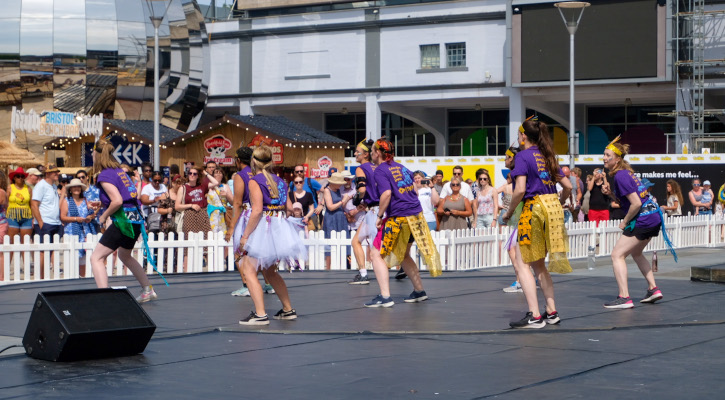
Movema perform on the Trinity curated Bristol Dances stage at Bristol Harbour Festival
We have partnered with award-winning dance charity Movema to deliver a programme of work with local schools and community groups.
The programme, made possible with support from the Coutts foundation, launches in Autumn 2022. Activities are planned throughout 2023 and will focus on children, young people and communities whose opportunity to take part in the arts is limited by background or circumstance.
“Dance is a powerful tool for communicating feelings and messages individually and collectively. Movema will explore dance styles and approaches that evolve from people standing up, pushing back and finding a physical voice in response to inequality and oppression”
Penny Caffrey, Director of Movema
Movema will work with schools local to Trinity (including Hannah More Primary and St Nicholas of Tolentine Catholic Primary) and a neighbourhood in Trinity’s immediate catchment.
The first schools-based project – ‘Dances of Resistance’ is inspired by Trinity’s Heritage Lottery project, Art of Resistance. Through a series of dance sessions the company will use their engaging learning tool ‘World In a Box’ –introducing children to places, people, festivals and cultures from around the world, helping to develop a greater understanding of the wonderfully diverse society we live in.
Children taking part in the school workshops will then be invited to weekly dance sessions at Trinity, hosted by Movema. Here they will take part in dance routines, make costumes and build connections - culminating in a Carnival Celebration.
The partnership responds to pledges we made following an in-depth community consultation in 2021 and aims to provide a continued offer of engagement – enabling and building connectivity with creativity and culture.
In Conversation: Gardna
In Conversation: Gardna
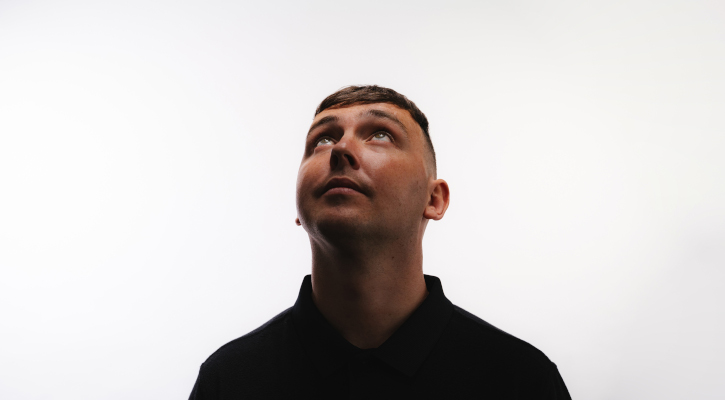
Gardna - Image Credit: Khali Ackford
Ahead of Gardna's headline show at Trinity on the 14 Oct, we sat down with the man himself to chat humble beginnings, highlights from 2022, and what makes Bristol such a special city to perform in.
Trinity are collaborating with Gardna as part of Trinity Presents, our in-house programme celebrating our diverse city and platforming emerging talent.
Can you tell us a little about the origins of Gardna?
This question immediately took me back to being a young wild and free G Man aged 13, I'd always be blue toothing grime riddims to my mateys on my flip up Sony Ericson phone outside the local skatepark standardly. Then bars became a hobby then it became something more serious, making tracks regularly so on and so forth, then gigs, hundreds of free gigs, and then yeah I haven't really stopped since.
How's 2022 been for you so far? Any particular highlights?
It's been absolutely crazy to be quite honest. The albums done alright, my tune R.A.V.E.A.S.A.P has had over 100 plays on Radio 1, it's even been getting smashed out on the Breakfast Show, my tune is on the Playstation game FIFA 23, I am currently BBC Radio 1 Future Artist of the month this month? Tore up Glastonbury, opened Boomtown and did 30+ festivals. Toured America with Mungo's Hi Fi. Been on one this year mate.
How has your relationship with Trinity developed over the years?
I've been coming here for a while now. Loads of unreal nights here over the years, the venue and it's love for sound system music is unmatched in this city. Jamell has had my back and put me on for a few things at the venue including their legendary Garden Party. He believed in me to put on my headline show at Trinity, it's a big leap of faith, but its happening.
In your opinion, what makes Bristol such a special city to perform in?
Bristol is Bristol innit. We know what we're doing here in this city. No messing about. There's really no place like home.
The lineup for your event at Trinity is quite something - how did you choose who to include?
First and foremost, I'm just a massive fan of everyone playing at this event. I've booked them to be there because they're flippin great and they know how to really work the dancefloor in true Gardna & Friends style and flavour. Whether I've met them this year, or we've known each other our whole teenage lives - this line up is my musical family and it's a representation of emerging artists, long time collaborators, Radio 1 DJs and absolute foundational legends. Everyone on this line up has in some way single-handedly changed the game for me at some point and I owe them ALL a pint. Or just a good gig in October.
What should the audience expect from your night at Trinity?
A celebration of the spectrum of sound system music. My biggest headline Gardna show to date. Amazing guests. Oh, and tears. There will be tears. And rum.
What's next for Gardna?
We have some banging R.A.V.E.A.S.A.P remixes and we're already deeply in the zone writing my next album right now. Can't stop won't stop. See you in October gang.
Gardna + Friends will play Trinity on 14 Oct as part of Trinity Presents, our in-house programme of music and arts. Click here to get your tickets.
Revolution Sounds
Revolution Sounds

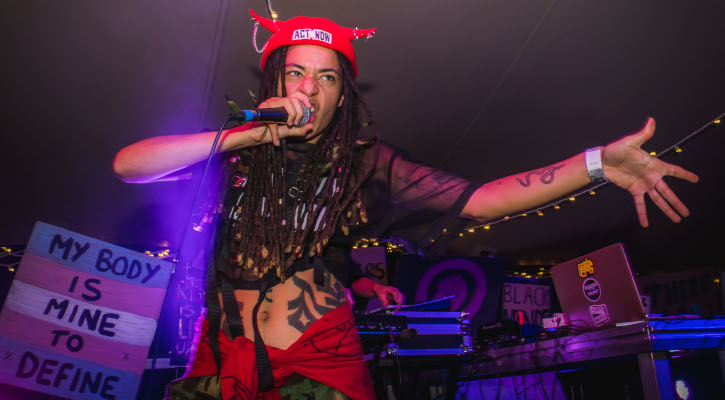
Grove - Image Credit: Sophia Stefelle
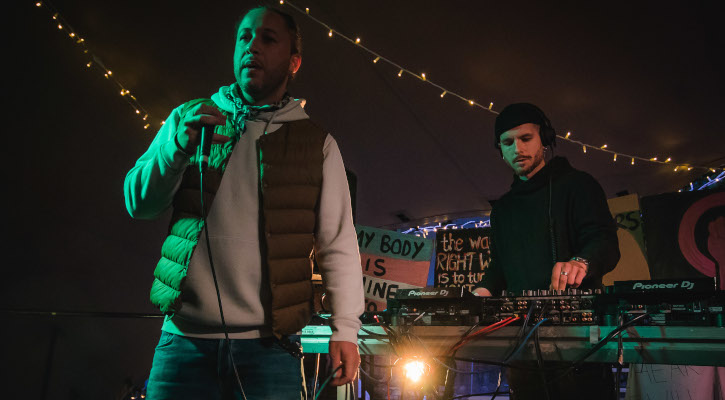
Kahn ft. Rider Shafique - Image Credit: Sophia Stefelle
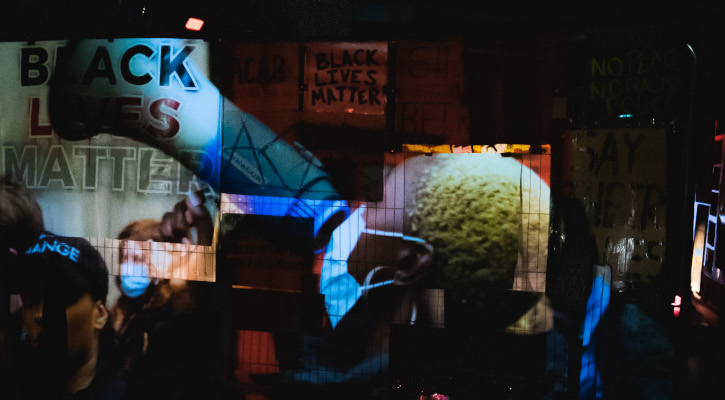
After The Fire - Image Credit: Sophia Stefelle
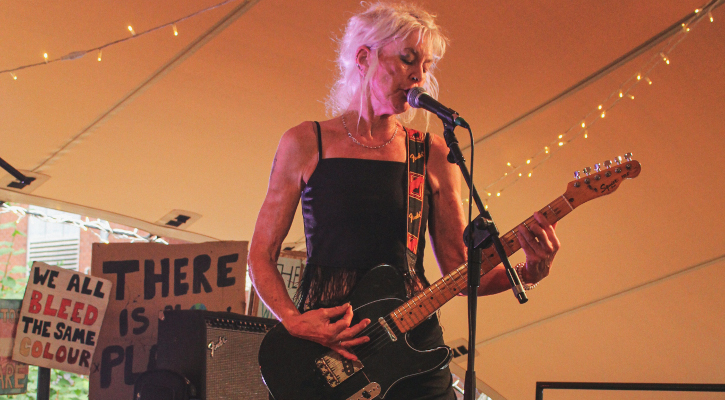
Rita Lynch - Image Credit: Marley Small
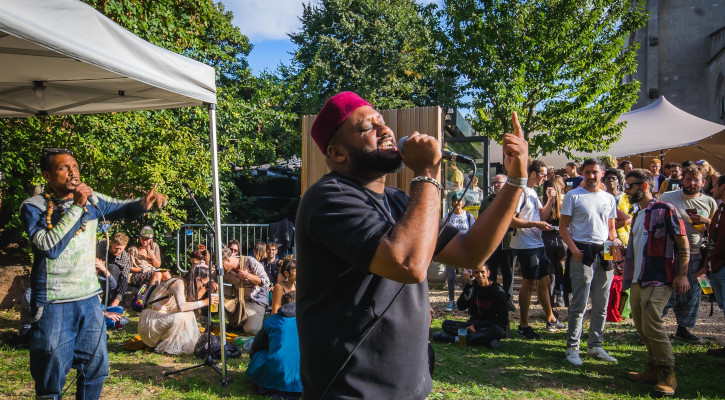
Hip Hop Garden - Image Credit: Sophia Stefelle
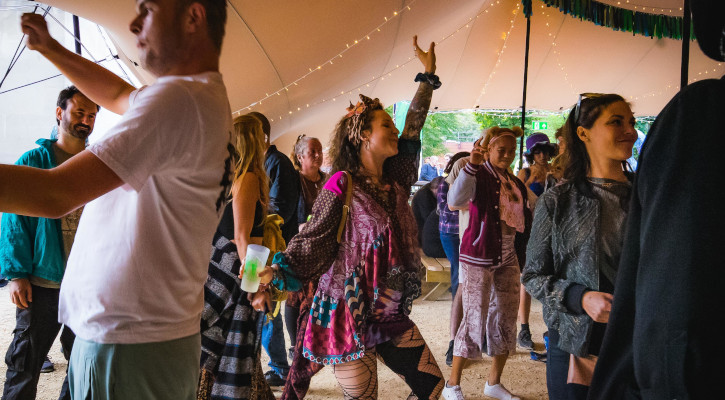
Image Credit: Sophia Stefelle
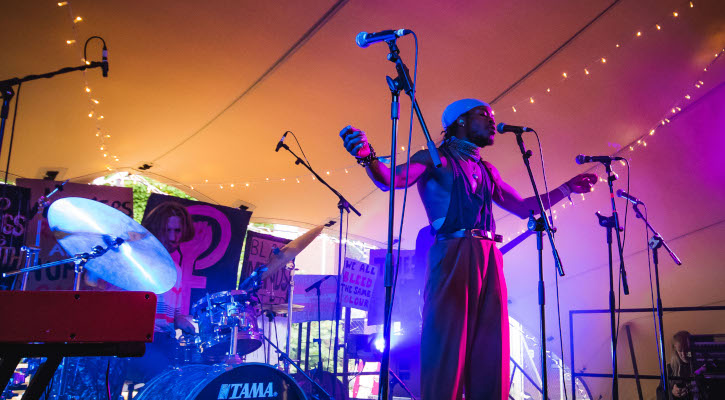
Solomon O.B - Image Credit: Sophia Stefelle
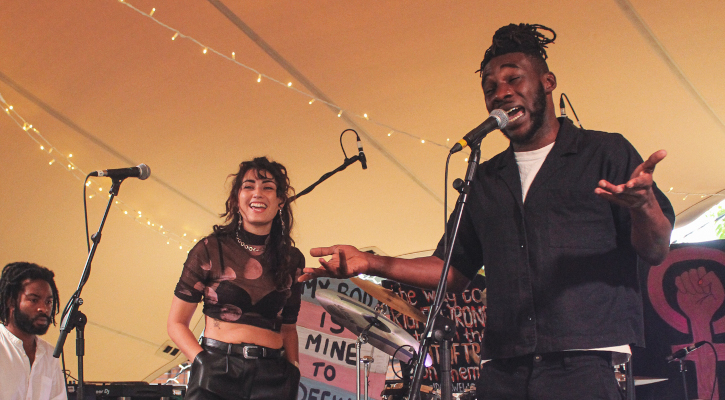
Irish Mellow + Cxption - Image Credit: Marley Small
Garden Party: Revolution Sounds was our second free-community event of the year where we said goodbye to the summer with a mix of live music, workshops, performances and an immersive exhibition: After The Fire.
As always we welcomed some of the best artists in Bristol and the South West all playing on The Den stage. From punk to experimental we had the likes of Rita Lynch, Talisman and Kahn. Kept a secret until they came on, headliner Grove closed out proceedings with an epic mosh pit.
"Inspirational people and artwork" Feedback, Garden Party: Revolution Sounds
In the Fyfe Hall, we hosted an immersive exhibition 'After the Fire', a thought-provoking odyssey through the sounds and sights of Bristol’s protest history in recent years. This exhibition allowed us to present a culmination of artwork made as part of the last two years of Art of Resistance - pieces created by participants including pottery and murals, alongside placards made as part of our Visions of Resistance including a mural made by Tanith Gould which was displayed outside People's Republic of Stokes Croft on Jamaica Street.
We also had a number of workshops running throughout the day, including Movema Dance Workshops and Button-Up Badge Making Workshop in the Main Hall, plus Hip-Hop Workshops in the Trinity Garden.
Big thanks once again to everyone that made this event possible - from the artists that performed, the exhibition curators, the workshop facilitators, the lighting and sound team working behind the scenes, the bar staff and Trinity Team, and of course all of you that came down on the day - over 1,200 of you came along, and we raised over £1,000 in donations so that we can put on more events like Garden Party for the local community.
If you'd like to stay in the loop with everything on at Trinity, head to our What's On page for all our upcoming events, or follow our Instagram, Facebook and Twitter and sign up to our mailing list to stay updated.
Art of Resistance is a two-year, National Heritage Lottery Funded project charting 100 years of protest in Bristol.





